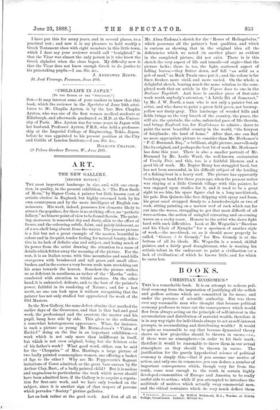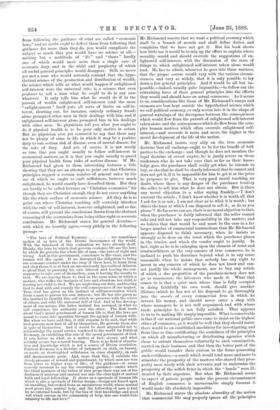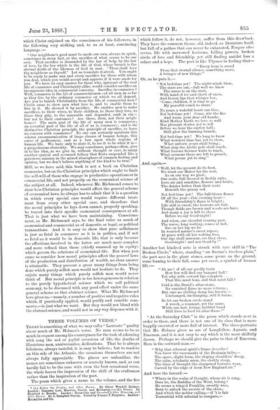BOOKS.
CHRISTIAN ECONOMICS.*
Tins is a remarkable book. It is an attempt to redeem poli- tical economy from the imputation of justifying all the selfish and godless actions which are committed in its name, and under the pretence of scientific authority. But was there ever any reasonable man who thought that because political economy professes to trace out the consequences which would flow from always acting on the principle of self-interest in the accumulation and distribution of material wealth, therefore it is in any way right for individuals always to act as self-interest prompts, in accumulating and distributing wealth ? It would be quite as reasonable to say that because dynamical theory shows us how projectiles should be thrown in vacuo,—i.e., if there were no atmosphere,—in order to hit their mark, therefore it would be reasonable to throw them in our actual atmosphere as they should be thrown in vacuo. The justification for the purely hypothetical science of political economy is simply this,—that if you assume one motive of action, and only one, in commerce, you can deduce a number of important consequences which, though very far from the truth, come near enough to the truth in certain highly developed communities of Europe and America to be really useful aids to action ; while if you attempted to introduce the multitude of motives which actually sway commercial men, and the ethical restraints which do very much deflect thew • Cnnotian Economics. By Wilfrid Richmond, M.A.. Wardell uf Trinity College. Gleualmond. London ltivingtmA.
from following the guidance of what are called "economic laws," and no doubt ought to deflect them from following that guidance far more than they do, you would complicate the subject so much that you would have no science at all,— nothing but a multitude of " ifs " and " thens " hardly one of which would meet more than a single case of economic duty, and in the whirl and perplexity of which all useful general principles would disappear. Still, we never yet met a man who would seriously contend that the hypo- thetical science of the production and distribution of wealth, the science which tells us what would happen if enlightened self-interest were the universal rule, is a science that even professes to tell a man what he ought to do in any case whatever. It only tells him what he would do if in the pm-suit of wealth enlightened self-interest (and the mere " enlightenment " itself puts all sorts of limits on self-in- terest, shutting out, for instance, entirely ordinary fraud) alone prompted other men in their dealings with him, and if enlightened self-interest alone prompted him in his dealings with other men. So physicians tell you what you ought to do if physical health is to be your only motive in action. But no physician ever yet ventured to say that there may not be plenty of aims in life in which it may be a positive duty to run serious risk of disease, even of mortal disease, for the sake of duty. And yet, of course, it is not nearly so true that you ought usually to follow self-interest in economical matters, as it is that you ought usually to guard your physical health from risks of serious disease. If Mr. Richmond had given to these interesting lectures a title showing that they are an attempt to point out that Christian principles suggest a certain number of general rules by the use of which we ought to curb selfishness, however much enlightened, he would exactly have described them. But they are hardly to be called lectures on "Christian economics," for though they are Christian enough, they do not cover anything like the whole surface of economic science. All they do is to point out where Christian teaching will certainly interfere with the rule of self-interest, however enlightened, and so far, of course, will prevent the conclusions drawn from the abstract reasoning of the economists from being either right or accurate conclusions. Mr. Richmond states his general doctrine,— with which we heartily agree,—very pithily in the following passage :—
"The laws of Political Economy are sometimes spoken of as laws of the Divine Governance of the world. With the falsehood of this contention we have already dealt. Plainly, the laws by which God governs economic life are the laws by which He governs the whole life of man—the laws of right and wrong. And in this government, conscience is His vicar, and the human will His agent. If we disregard the obligation to bring our economic conduct under the sway of these laws, to learn them and obey them, it is at best an unconsciously hypocritical delusion to plead. that, in pursuing his own interest and leaving the con- sequences to take care of themselves, man is leaving the results to God. We are leaving them to God in the same sense in which a mother, who stifles the instincts of love and abandons her child, is leaving her child to God. We are neglecting our duty, and leaving God to deal with and remedy the evil consequences of our neglect. True, God has given us the instinct of self-preservation which leads a man to pursue his own interest ; but He has also given us the instinct to identify this self which we preserve with the selves of others, and with the universal Self of God. And in the develop- ment of our nature, this latter instinct has assumed, in what we call conscience, the authority over the other. The first truth about God's moral government of human life is, that His laws are meant to come into operation through the agency of human wills. But when we have said this, it still remains to be said, that while God governs men first of all by themselves, He governs them also in spite of themselves. And it would be most ungrateful not to acknowledge the moral service rendered to the world by Political Economy, in exhibiting this side of the moral government of God. It sets before us what, as a matter of fact, occurs, and what actually occurs has a moral bearing. There is no field of observa- tion and knowledge which is not a source of Divine revelation. Political Economy is a doctrine of judgment on sloth, on luxury, on waste, on shortsighted selfishness, on crass stupidity, on rash and inconsiderate pride. And, more than this, it exhibits the steady pressure of reward and punishment, by which men are won from lower to higher ways of life ; of the guidance—it seems scarcely reverent to say the overruling guidance—under which the blind instincts of the tribes of men grope their way out of the darkness of mistrust and mutual war into the clear light of mutual faith and loyal fellowship. It shows us a spectacle of human life which is also a spectacle of Divine design—design not forced upon an unwilling, but evoked from an unconscious world, where mutual need grows into mutual help ; and the fellowship of men is knit by no external bonds, but by the ties of that knowledge and good will which emerge in the community of help, into one world-wide ministry to life and love."
Mr. Richmond asserts that we want a political economy which shall be a branch of morals and shall define duties, and complains that we have not got it. But his book shows how little use it would be to mix up the effort to explain where morality would and should overrule the suggestions of en- lightened self-interest, with the discussion of the state of things to which enlightened self-interest taken alone would lead. He has to admit, whenever he goes into these matters, that the proper course would vary with the various circum- stances, and vary so widely, that it is only possible to lay down a few general principles. And it would be all but im- possible,—indeed, usually quite impossible,—to follow out the restraining force of these general principles into the effects they would and should have on actual commerce. As it seems to us, considerations like those of Mr. Richmond's essays and sermons are best kept outside the hypothetical science which we call political economy, or only woven into it in the shape of general warnings of the divergence between the consequences which would flow from the pursuit of enlightened self-interest taken alone, and the consequences which do flow from the com- plex human motives which often overrule enlightened self- interest—and overrule it more and more, the higher is the moral development of the life of the nation.
Mr. Richmond insists very ably on the true economic doctrine that all exchange ought to be for the benefit of both parties to the exchange ; and though he does not mention the legal doctrine of caveat emptor, he is justly severe on those tradesmen who do not take care that, as far as their know- ledge goes, the purchaser shall really get what he intends to buy, or else that he shall be clearly informed that he cannot and does not get it, if it be impossible for him to get it at the price he proposes to give. That is very good moral teaching, no doubt, where there is any danger of the purchaser trusting the seller to sell him what he does not obtain. But is there any moral objection to a seller saying frankly,—' I don't warrant the article ; I don't know whether it is worth all that I ask for it or not ; I am not clear as to what it is worth ; but this is the least at which I am disposed to sell it; so do as you please'? So far as we can see, there is no moral objection to that, when the purchaser is fairly informed that the seller cannot take and will not take any responsibility in the matter; and we believe that that would be and must be the case in a far larger number of commercial transactions than Mr. Richmond appears disposed to think necessary, when he insists so strongly as he does on the trust which the purchaser places in the vendor, and which the vendor ought to justify. In fact, right as he is in enlarging upon the element of trust and. trustworthiness as the very essence of true commerce, he is inclined to push his doctrines beyond what is in any sense reasonable when he insists that nobody has any right to invest in any concern of which he does not know and can- not justify the whole management, nor to buy any article of which a due proportion of the purchase-money does not go to remunerate the labourers who made it. What that comes to is that a quiet man whose time is fully occupied in doing faithfully his own work, should give another lifetime (which he has not at his disposal) to go thoroughly into the morale of every commercial firm in which he invests his money, and should never enter a shop with whose managers he is not well acquainted, and with whose trade principles be is not fully satisfied. That appears to us to be making life simply impossible. What is conceivable is that if our national public once came to insist on the highest ethics of commerce, as it would be well that they should insist, there would be an established machinery for investigating, and from time to time certificating, the soundness of the principles on which all manufacturing or distributing agencies which chose to submit themselves voluntarily to such examination, carried on their business, and that then the better part of the public would transfer their custom to the firms possessing such eertificates,—a result which would tend more and more to stimulate the prosperity of the masters who shared that pros- perity most wisely with their servants, and to undermine the prosperity of the selfish firms in which the " hands " were ill- treated by their superiors. But what Mr. Richmond seems to expect of private people under the present circumstances of English commerce, is unreasonable simply because it would make life absolutely impossible.
Mr. Richmond states the absolute absurdity of the notion that commercial life may properly ignore all the principles which Christ enjoined on the consciences of his followers, in the following very striking and, to us at least, convincing language :—
" Our neighbour's good must be made our own, always in spirit, sometimes in stern fact, at the sacrifice of what seems to be our own. That sacrifice is demanded by the law of help, by the law of love, by the law which is the life of God, whose breach is the eternal death of the likeness of God in man. Thou shalt love thy neighbour as thyself.' Let us translate it afresh. You ought to be ready to make any and every sacrifice for those with whom you deal, which you would accept and approve if it were made for you. We have an easy answer for those who, ignorant of the real life of commerce and Christianity alike, would consider sacrifice an incongruous idea in commercial concerns. Sacrifice in commerce ? Well, commerce is the life of commercial men—of all men, in so far as they live by the ordinary commerce on which we all depend. Are you to banish Christianity from the life of commercial men ? Christ came to show men what love is, and to enable them to live in it. He showed it by sacrifice. He enables men to make sacrifices, to their wives, to their children, to those they love, to those they pity, to the miserable and degraded, sunk in sin— but not to their customers ? Are these, then, not their neigh- bours? The main part of the life of many men is commerce ; an essential part of the life of all of us is commerce ; and is the distinctive Christian principle, the principle of sacrifice, to have no concern with commerce ? No one can seriously maintain this solemn excommunication of large classes of human beings, this curse of godlessness, cast as a ban upon whole regions of human life. We have only to state it, to see it to be what it is— a preposterous absurdity. We may sometimes, perhaps often, give in to the idea, as we give in, without thought or care, to many another cynical and accursed fallacy that floats suspended like a poisonous miasma in the mixed atmosphere of common feeling and opinion, but we don't believe anything of the kind to be true."
Still, as we have said, this book is not a book on Christian economics, but on the Christian principles which ought to limit
the self-will of those who engage in productive operations or in commercial life, and not properly on the economical science of the subject at all. Indeed, whenever Mr. Richmond comes to show how Christian principles would affect the general scheme of economical laws, he always has to admit that it is a question in which every special case would require different treat- ment from every other special case, and therefore that the moral principles he lays down cannot, properly speaking, be traced into their specific economical consequences at all. That is just what we have been maintaining. Conscience must, as Mr. Richmond says, be the final ruler as much of economical and commercial as of domestic, or legal, or political transactions. And it is easy to show that pure selfishness is just as fatal in commerce as it is in politics, and if not so fatal as it would be in domestic life, that is only because the affections involved in the latter are much more complex and more refined than those (chiefly summed up in equity) which govern the relations of economical life. But when you
come to consider how moral principles affect the general laws of the production and distribution of wealth, no clear answer
is attainable. They prevent a great many things from being done which purely selfish men would not hesitate to do. They enjoin many things which purely selfish men would never think of. But moral principle is too heterogeneous in relation to the purely hypothetical science which we call political economy, to be discussed with any good effect under the same general scheme as that abstract science. What Mr. Richmond here gives us,—namely, a number of positive and negative rules which, if practically applied, would purify and ennoble com- merce,—is just what we want. But they would not blend with the abstract science, and would not in any way dispense with it.








































 Previous page
Previous page